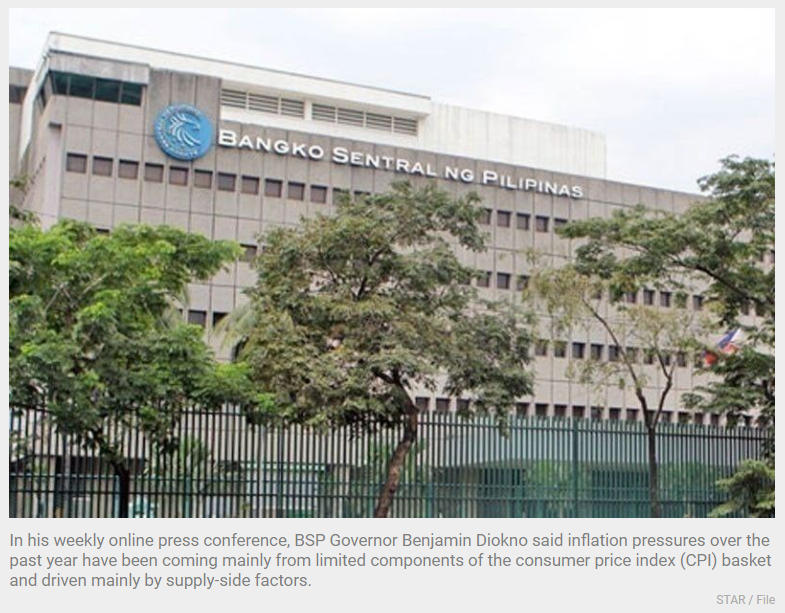Philippines: BSP sees no 2nd round effects on inflation
MANILA, Philippines — The Bangko Sentral ng Pilipinas (BSP) said there are no clear signs of emerging second round effects as inflation remained above the government’s two to four percent target due to higher oil and food prices.
In his weekly online press conference, BSP Governor Benjamin Diokno said inflation pressures over the past year have been coming mainly from limited components of the consumer price index (CPI) basket and driven mainly by supply-side factors.
“There are no clear signs of emerging second round effects in transport fares or wages,” Diokno said.
Inflation averaged 4.5 percent from January to September as monthly print stayed mostly above the BSP’s two to four percent target since the start of the year. It eased slightly to 4.8 percent in September from a 32-month high of 4.9 percent in August.
Aside from rising global oil prices, Diokno said food prices, particularly meat, remained elevated due to the impact of weather disturbances and the African swine fever (ASF) outbreak.
The BSP chief said the economy is still in the early stages of recovery and has unused capacity that is also mitigating second round effects.
“Given the manageable inflation outlook, our priority is to maintain the current monetary accommodative policy for as long as needed to ensure sustained economic recovery. Nevertheless, the BSP stands ready to respond to second round effects or more broad based pressures as the economy recovers fully,” Diokno said.
Based on its latest assessment, the Monetary Board sees inflation accelerating to 4.4 percent this year before easing back to 3.3 percent next year and 3.2 percent in 2023.
Recent inflation data suggest that non-monetary government measures to augment the domestic supply of key food items have been effective in tempering inflationary pressures.
“The domestic prices of key agricultural commodities such as fruits, fish, and pork as recorded in the CPI data have declined in recent months. With continued implementation of non-monetary supply-side measures, the BSP expects ongoing price pressures to dissipate further in the coming months,” Diokno said.
The recent uptick in inflation has been traced mainly to higher prices of a limited number of CPI basket items owing to supply-side pressures that are considered transitory in nature.
“Responding to higher inflation requires a clear understanding of the reasons behind inflationary pressures. Demand-driven inflation often requires a firmer monetary policy response. On the other hand, higher inflation caused by rising producer costs or supply-side constraints requires direct non-monetary interventions that help ease those supply constraints,” Diokno said.
Consistent with its role as an inflation targeting central bank, the BSP accommodates the initial impact of supply-side shocks as these typically prove to be short-lived in nature.
At the same time, direct non-monetary policy interventions by the national government serve as a more appropriate and targeted means of addressing supply-driven inflation.
“Our manageable inflation outlook provides us with ample room to keep the monetary policy stance sufficiently accommodative to support the ongoing economic recovery. Inflation expectations continue to be broadly anchored over the policy horizon, with the above-target mean inflation forecast from analysts for 2021 giving way to lower expected inflation in the following year,” Diokno said.
The central bank has kept interest rates at record lows for the past rate setting meetings of the Monetary Board or since November last year when it last tweaked policy rates.
Nevertheless, the BSP continues to be vigilant in monitoring the evolution of price conditions and stands ready to respond to signs of potential second-round effects from supply-side inflation pressures.
In deciding on the monetary policy stance, the BSP will continue to be guided primarily by domestic considerations, particularly the outlook for inflation and prospects for domestic demand as the economy gradually reopens and gathers further momentum.
Diokno said the BSP would continue to assess the impact of the decision of major central banks including the recent decision of the US Federal Reserve to start winding back its $120 billion a month bond buying program.
“The BSP’s decision making on the monetary policy stance remains focus primarily on domestic developments particularly the outlook for inflation and growth, while also taking into consideration external developments so far as they affect domestic economic conditions and the future path of inflation,” Diokno said.
According to Diokno, the Philippine economy would continue to recover in an environment of tighter global financial conditions as part of the normalization path taken by major central banks.
The BSP chief cited the country’s robust external payments position including the growing gross international reserves (GIR) and the flexible exchange rate system serving as the first line of defense against global shocks.
“Equally important, the BSP has various tools available to respond to any short term market volatility as its huge GIR remains in place as a buffer against potential shocks from the external environment,” Diokno said.
Source: https://www.philstar.com/business/2021/11/05/2138994/bsp-sees-no-2nd-round-effects-inflation


 English
English




